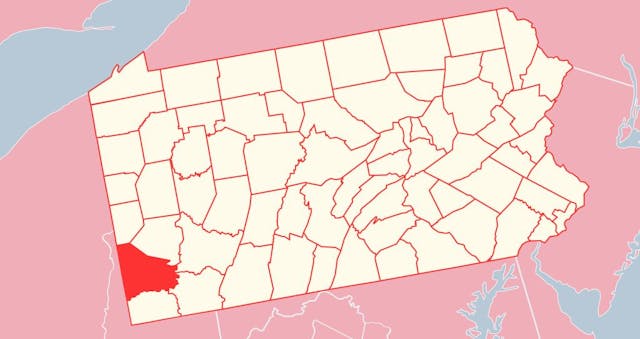Rehabs in Washington
Washington County is located in the US state of Pennsylvania. Its administrative center is in Washington. According to the 2010 US census, the region had a population of 207,820.
The division is home to many beautiful cities and towns. There are many tourist attractions here, such as the PA Trolley Museum and several state parks. However, like many provinces in the US, this region also has high drug abuse rates. The consumption of fentanyl and opioids caused hundreds of accidental overdoses during the last several years.
As to the 2021 Annual Report made by the Washington County Coroner’s Office, 2021 was the year with one of the highest rates of drug-overdose fatalities in this county. That is to say, in 2021, there were 106 overdose-related deaths (70 men and 36 women) in Washington County.
For that, it is possible to find several addiction treatment programs and rehabs in Washington County. These centers will give new coping skills and strategies to help build a new and healthy lifestyle.
Available Treatment Options
Addiction affects all the spheres of a person’s life. Even if it causes a variety of problems, many people cannot stop their use of drugs and alcohol. Hence, the expert team of the Washington County rehabs is to provide medical and emotional support to those struggling with dependence.
The regional rehabs offer a wide range of addiction treatment services such as detox, inpatient and outpatient therapy, partial hospitalization program, aftercare, etc.
Detox
This is an uncomfortable procedure that may cause unpleasant and painful withdrawal symptoms. Thus, people with severe addictions should not go through this procedure alone, as the consequences can have even deadly outcomes.
Moreover, with professional support, a person may easily come back to drug or alcohol abuse. So, the expert team of the detox center makes this process comfortable and safe for their patients.
Detox alone is not a treatment. It is a kind of preparation for further rehab.
Inpatient Care
Inpatient rehab is a great place to start the path to lifelong recovery and become sober. The expert team of doctors, nurses, and therapists supervises the whole program. In other words, a person receives evidence-based treatment with round-the-clock support.
Inpatient treatment offers a safe environment without addictive substances. In this structured setting, a person concentrates only on the therapy.
Patients are to attend group and individual therapy, get assistance from family, and be a part of a peer support network. Besides, there are also art and music therapy and sports included in the program.
The length of inpatient therapy depends on the medical history and type of addiction. The common plan lasts from 30 to 40 days.
Partial Hospitalization Program (PHP)
PHP is a step down from inpatient care. However, it is for patients that need an intensive level of care but can’t afford it.
The goal of PHP is to stabilize the symptoms and reduce substance use. The expert staff of clinicians and advanced methods assist in the process of healing.
Outpatient Care
Outpatient care offers flexibility and independence to its patients. They don’t have to stay at the facility and should visit only for their scheduled treatment. This also means that they can continue with their daily responsibilities and get treatment at the same time.
There are two main stages of outpatient care:
Intensive (IOP), which has the same components as PHO. However, it does not last a full day. Patients have only three-hour sessions, three times a week.
General (GOP) is more about improving the quality of life and developing relapse prevention skills. So, in this stage, the patient tries to overcome the impacts of trauma, anxiety, and depression.
Aftercare
Aftercare is a vital part of the healing process. That is to say, continuous assistance prevents the risks of relapse. It encourages continuing substance addiction counseling even after leaving the clinics. Being a part of a support group and talking to people with the same addiction issues make the process of keeping sobriety easier.
There are Narcotics and Alcoholics Anonymous groups accessible in Washington County, Pennsylvania. They gather people in one place and encourage them toward a healthier and sober life.
Payment
Sometimes people struggling with addiction do not apply for rehab, as they can’t afford it. However, many public and private insurance plans provide full or partial coverage of the rehab expenses. There are also state-funded rehabs that offer free or low-cost amenities. Other financing options, like grants, scholarships, or sliding fee scales are also accessible.

